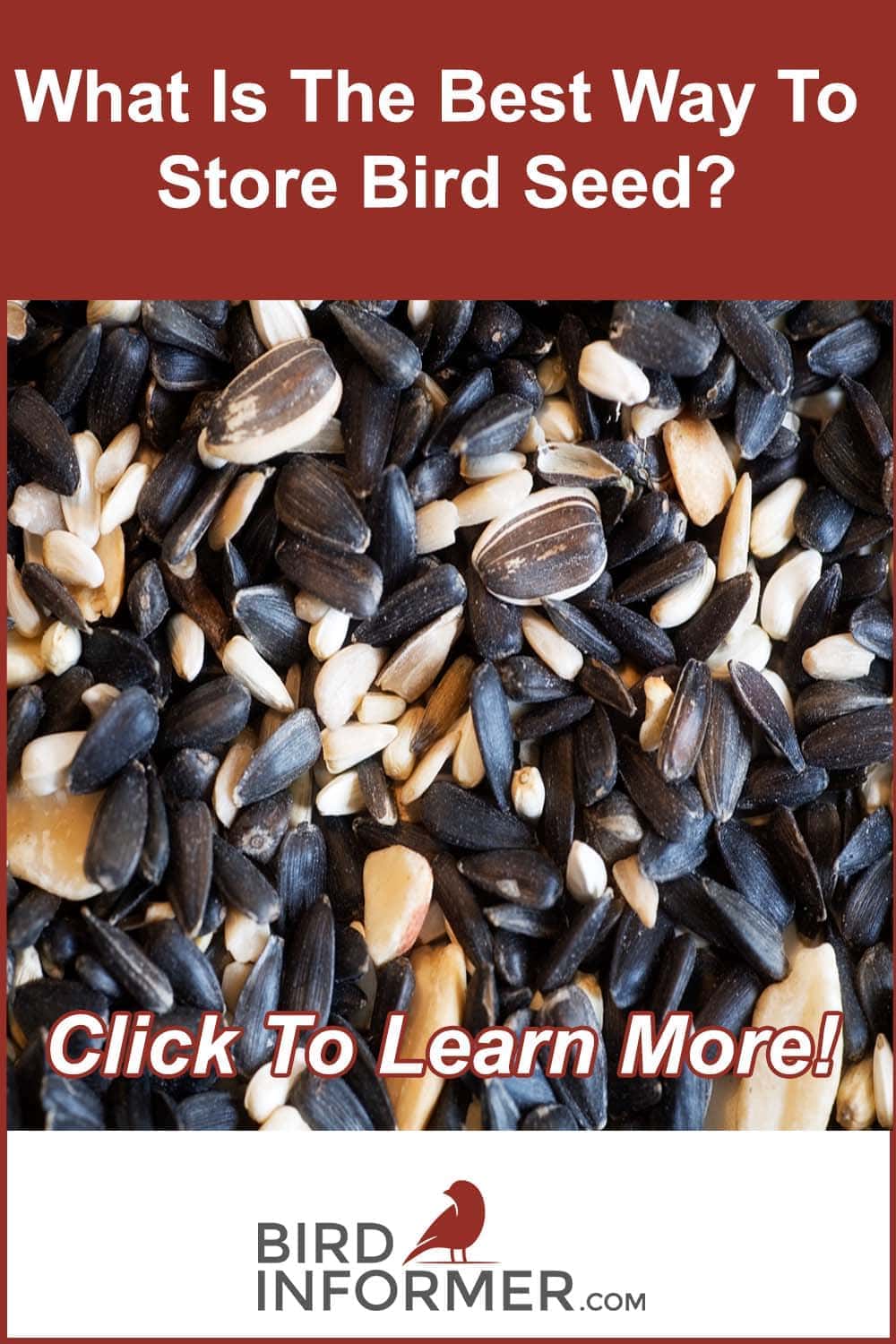Contents
Opening a bag of birdseed and discovering that it has spoiled or gone stale gets exhausting really quickly. It’s so frustrating to spend your hard-earned money, only to see it go to waste. I feel your pain and I’ve personally struggled enough to research this topic. So, I’ve decided to share my how-to store bird seed tips with you below.
Pay attention to the expiration date when storing bird seeds. If the seeds approach the six-month-old mark, use them and rotate in new seeds with a better expiration date. Store them in a cool, dry place to avoid moisture and spoilage. And keep the seeds in storage containers because they’ll stay fresh longer.
And we’re just getting started.
Discover the detailed information that I have in store for you right now. Other important bird seed storage issues to discuss include:
- When to use plastic storage containers
- The right situation to use metal storage containers
- The ideal bird seed storage locations
- How to label bird seed storage containers
Stick around to learn the truth about this crucial topic.
Plastic Storage Containers: The Ideal Situation To Use These Lightweight Vessels
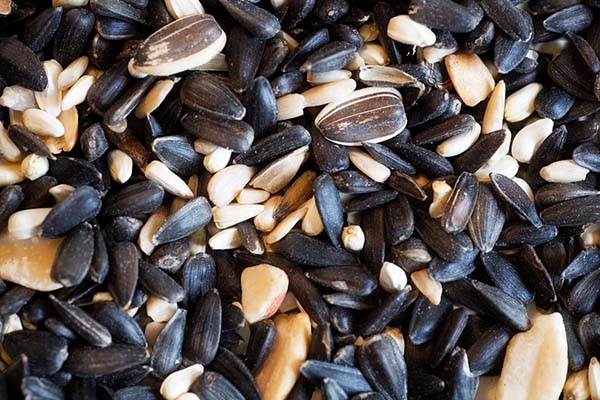
Storing bird seeds in plastic containers seems like a no-brainer. But is it always the right choice?
From personal experience and detailed research, I can tell you with full confidence that using plastic storage containers isn’t always the best idea.
Some people prefer to keep their bird seeds stored in an outdoor storage shed, their garage, or inside their basement. There’s nothing wrong with storing seeds in these locations, but you have to be aware of the situation.
What do I mean?
Critters are nosy little buggers that like to stick their heads in places where they don’t belong. Their nosiness can cause problems and it’s the reason why some people need to use metal storage containers, which I’ll touch upon next.
Think about where you intend to store your bird seeds…
Will they remain safe inside your home? Or will you store them in a vulnerable place that critters like mice, rats, and squirrels can reach?
Using plastic storage containers that will remain safely protected in your home is perfectly fine. In fact, it’s a great idea because plastic containers are lightweight and easy to carry.
If your seeds are going to be potentially exposed to birds and other critters, you’d likely benefit from choosing a metal storage container as an alternative.
Related article: What Kind Of Bird Seed Is The Best For My Backyard Birds?
Metal Storage Containers: The Best Defense Against Outside Forces
You may not realize this, but outside forces are going to mess with your bird seeds from time to time. Believe it or not, this is going to happen more often when you store your bird seeds in an outdoor location.
On the surface, it seems…
Storing your bird seeds in the shed or in your garage sounds like a great idea. The seeds will remain out of your way and closer to the bird feeders.
It’s a true win-win scenario, right?
Wrong!
And the only reason it’s wrong is that critters are always scrounging around and looking for food. They’re always poking their little noses in places where they don’t belong.
If you leave bird seeds in an outdoor shed, you should never keep them stored in a plastic container. Rodents, raccoons, and squirrels will smell the seeds from a mile away.
Do you know what else will happen?
These ravenous animals will break into your plastic storage bin in no time flat. They’ll either knock it over and remove the lid, or even worse, they’ll chew through the plastic to get to the tasty bird seeds inside!
I don’t know about you, but I personally want to avoid this like the plague. And it’s the reason why I stick with metal storage containers for outdoor and basement seed storage.
Metal containers are a perfect choice. Wildlife will not be able to chew through the metal because it’s too tough for their teeth.
And the elements like rain, sleet, or snow could potentially damage your bird seeds if you store them outside.
In this case, you should use a storage container made of galvanized metal. It will not rust and it will keep your seeds safe and protected from outside forces that could potentially cause them harm.
Bird Seed Storage Locations: Tips For Choosing The Perfect Spot
It shouldn’t surprise anyone to learn that it’s best to store birdseed inside a cool, dry place. By storing your seeds this way, you are preserving the essential nutrients while keeping them fresh and wholesome.
And if you follow this guidance, you’ll keep your seeds in a few crucial locations that guarantee the best possibility of retaining their freshness.
These locations include:
The Garage
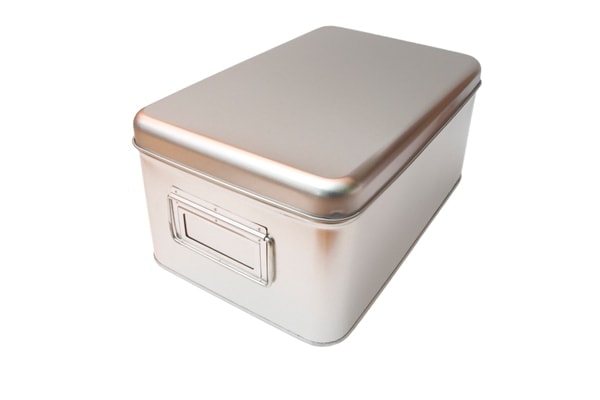
For most people, their garage is the coolest place in the entire house. It doesn’t seem to heat up and get really hot unless the temperature is scorching outside.
Find a secluded corner of your garage to store your bird seeds. Or better yet, build a group of shelves to hang on your walls. You can store your bird seeds safely on your new shelving.
Do you have critters roaming around your garage? I didn’t ask this question to embarrass you or make you feel uncomfortable. I ask because critters – especially rodents – love eating tasty oil-filled bird seeds.
If critters are a problem, you should keep your seeds inside metal storage containers. It will keep the critters at bay and the bird seeds fresh, tasty, and nutrient-dense.
The Basement
Many people have ample storage space available in their basement. For a wide range of us, this space has turned into a storage facility for old electronics, paperwork from 30 years ago, and other things that we should’ve thrown out in the 1980s!
Now: it’s time to transform this space and turn it into the supreme location to store your bird seeds. Most basements are very cool all year round.
And…
Many finished basements are climate-controlled, so you can regulate the temperature to meet your needs.
Like the garage, you can choose a corner to store your seeds in plastic or metal containers depending on which makes the most sense for your situation. Or, you can set up shelves to create a simple yet effective area for seed storage.
The Outdoor Shed
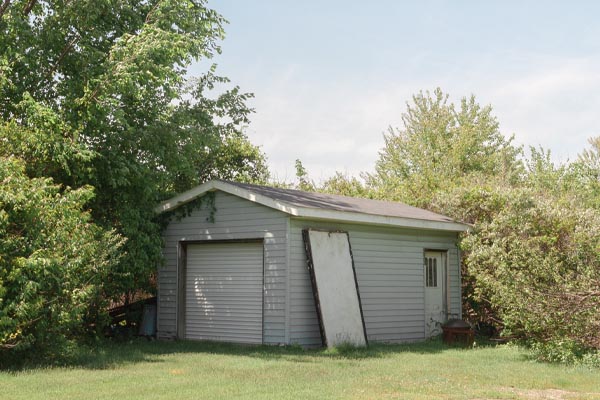
I love storing my seeds in my outdoor shed because it keeps them closer to my bird feeders, so this storage location is incredibly convenient.
But…
I built my shed underneath a large oak tree that gets plenty of shade. Even on the hottest days in the summer, my shed doesn’t get too hot. If it did, it would cause the seeds to spoil much quicker and we certainly want to avoid that at all costs.
So…
Do you have an existing shed? Is it located in an area in your backyard that’s well hidden and protected from the sun? If so, you should certainly consider storing bird seeds in metal containers in this convenient location.
Or better yet…
Build a brand-new shed for birdseed storing purposes. And as I’ve said numerous times, choose a location that keeps it well hidden and protected from the sun. This will prevent the heat from overwhelming the shed and ruining your expensive bird seeds.
Inside The House
When you have no other choice, it’s perfectly acceptable to store your bird seeds inside the house. In fact, it might be the most convenient way to keep your seeds safe and protected.
I’ll have to assume that you don’t have too many critters running around your house. But at the same time, you may have cats, small dogs, hamsters, ferrets, and other rodents sniffing around all over the place.
If this is the case, you should keep your seeds stored in a locked cabinet or closet that your animals cannot get to. And for added protection, you can always keep them inside metal storage containers.
Figure out the best place in your house to keep your bird seeds stored and choose this location. Test it out for a little while to see if it’s the best place to store seeds.
Related article: Can You Place Bird Seed In A Birdhouse?
Bird Seed Storage Labels: What Should I Add?
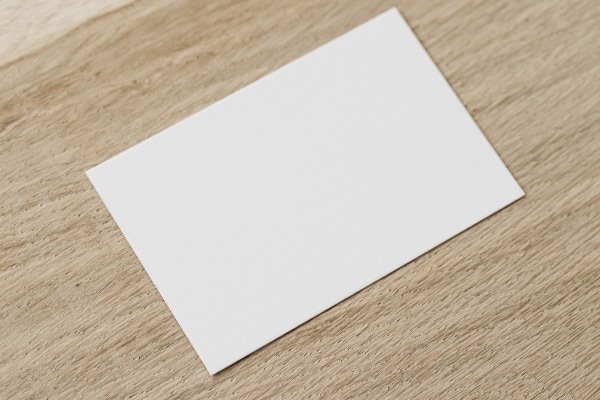
When labeling your storage containers, consider adding the following information:
- Brand name
- Bird seed types (black oil sunflower seeds, safflower seeds, etc.)
- Date of purchase
- Expiration date
- Retail outlet
I specifically like to add this information to keep track of my seeds and where they came from.
This helps me determine if a particular retail outlet characteristically sends me old seeds on the verge of spoiling. By tracking the date of purchase and the expiration date, I’ll know exactly when I should feed them to my favorite backyard birds to prevent spoilage.
Related article: How Long Should Bird Seed Last?
A Final Review On How To Store Bird Seeds
Wow! I bet you didn’t realize there was so much involved with storing bird seeds.
But it’s an important topic nonetheless. Keeping fresh seeds available for your favorite outdoor friends means they remain healthy, energetic, strong, and happy!
And this is exactly what we want for the outdoor birds, right?
To recap, you should keep the following in mind when storing bird seeds:
- Use plastic storage containers when storing them indoors and keep them away from bugs and critters
- Use metal storage containers when storing them outdoors because they’re vulnerable to critters, rodents, and the elements
- Always keep your seeds stored in a cool, dry place to preserve maximum freshness
- The best storage locations include the garage, the basement, the outdoor shed, or inside the house
- Add the brand name, seed types, date of purchase, date of expiration, and retail outlet to your homemade storage labels
These rules will help you keep your seeds fresh and safe from critters and outdoor elements. Use this information wisely because it will help save you money, time, and unnecessary headaches!

